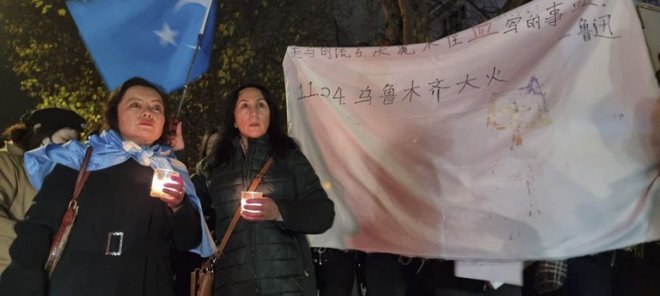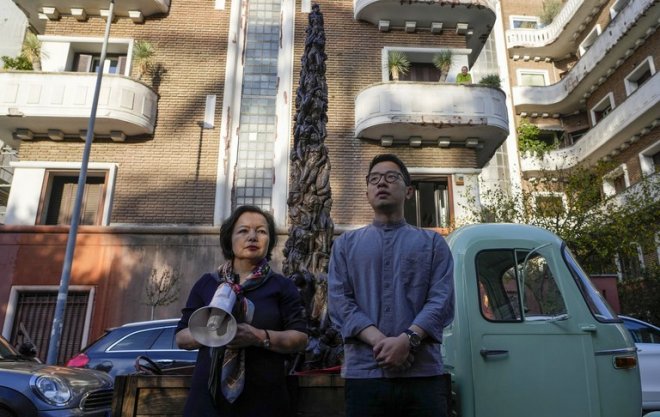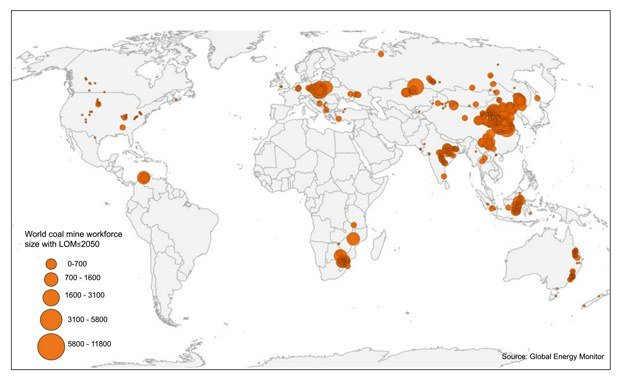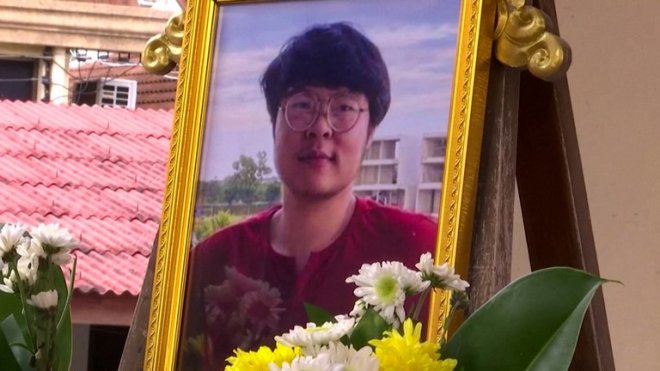INTERVIEW: 'I think we have the beginning of mutual understanding'
U.K.-based rights activist Rahima Mahmut has long been a vocal critic of the Chinese government, taking aim at the mass incarceration, surveillance and persecution of the Uyghur ethnic group in Xinjiang and countering Beijing"s official propaganda from overseas.She has recently also made common cause with majority ethnic Han Chinese people studying in Britain, not least during a series of protests in London in solidarity with the political events in China that marked the last months of 2022.
A long-term resident of the United Kingdom, Mahmut spoke to RFA"s Mandarin Service about how Chinese Communist Party propaganda harms Uyghurs, and about the potential for a multi-ethnic movement to fight for human rights and democracy in China, inspired by the recent "white paper" protests in China, which were in part an outpouring of grief over the deaths of Uyghurs during a lockdown fire in Xinjiang"s regional capital Urumqi.
"I was very touched to see so many Han Chinese students come out to pay tribute to the Uyghurs who died," Mahmet said of a Nov. 27 rally held in drizzling rain outside the Chinese Embassy in London, in the wake of the Urumqi blaze.
"Ninety percent of them were young people, and they are finally coming out," she said.
Mahmut didn"t say much to them at first, but then a young Han Chinese man commented on the flag she had brought – the pale blue flag of an independent East Turkestan representing Uyghurs" wish for a nation-state of their own in what is currently Xinjiang.
The student wanted to know why she insisted on calling for independence for Uyghurs.
"I told him it was my dream, and that I should at least be allowed to dream it," Mahmut said. "Look at here – Scotland has its own parliament, its own flag, its own football team that takes part in the World Cup, and the Scottish National Party that calls for independence every day, and yet the British government doesn"t arrest them."
"Neither do they imprison them as separatists," she told the man.
Labeled separatists and extremists
Pretty soon, the conversation had attracted the attention of other Chinese students at the rally, who gathered round and started asking Mahmut questions, all of which she addressed patiently, one by one.
"I just told them about the persecution that we Uyghurs have suffered, and how we have nothing to do with so-called terrorists," she said. "[I said] we are very opposed to such violence, because it won"t bring us any benefits."
"It"s just the Chinese government, this anti-Uyghur propaganda, that calls us separatists and extremists," she told the students.
 Uyghur activist Rahima Mahmut
Uyghur activist Rahima Mahmut attends a vigil for victims of the Urumqi fire outside the Chinese Embassy in London, Nov. 27, 2022. Credit: Courtesy of Rhima Mahmut
By International Human Rights Day on Dec. 10, Chinese activists in the U.K. had sought out the Uyghurs and suggested making common cause with them.
"We were joined on Human Rights Day by a new team – of rights activists from mainland China, many of whom said they wanted to stand united with the Uyghurs, making our voices louder," Mahmut said, adding that this was an unprecedented event that was largely sparked by the public outcry over the Urumqi lockdown fire.
For her part, she is willing to keep educating Chinese studying overseas about the treatment of Uyghurs at the hands of the Chinese state.
"Han Chinese have always been treated preferentially, while Uyghurs have always been treated like second-class citizens," Mahmut said, adding that it"s also not an easy task.
"The mutual trust between Han Chinese and Uyghurs has been shattered for a long time now," she said. "Naturally, one feels that these people have taken away everything that should belong to you. That"s how it feels."
Personal story
Mahmut is speaking directly from her own experience.
She was unable to find a job in Urumqi after graduating from the Dalian University of Technology in the early 1990s, yet saw plenty of Han Chinese who were less well-qualified get hired instead.
Later, after becoming a teacher, Mahmut saw Han Chinese teachers given preferential treatment, while the authorities treated Uyghur teachers as a potential threat to official ideology, liable to spread "politically incorrect" ideas in the classroom.
Such discrimination is visible in almost every area of daily life in Xinjiang, with Uyghurs an oppressed minority from school to workplace, she said.
What"s more, the Communist Party"s depiction of Uyghurs as potential extremists or terrorists appears to have worked on most of the Han Chinese population.
"Particularly among Han Chinese who"ve never had any contact with Uyghurs, they already have a preconceived impression that we are very violent, and can"t be trusted," Mahmut said.
"Some Han Chinese say Uyghurs are thieves, and will steal from you, which is a racist and insulting thing to say about any ethnic group," she said.
![]() Uyghur activist Rahima Mahmut
Uyghur activist Rahima Mahmut
By International Human Rights Day on Dec. 10, Chinese activists in the U.K. had sought out the Uyghurs and suggested making common cause with them.
"We were joined on Human Rights Day by a new team – of rights activists from mainland China, many of whom said they wanted to stand united with the Uyghurs, making our voices louder," Mahmut said, adding that this was an unprecedented event that was largely sparked by the public outcry over the Urumqi lockdown fire.
For her part, she is willing to keep educating Chinese studying overseas about the treatment of Uyghurs at the hands of the Chinese state.
"Han Chinese have always been treated preferentially, while Uyghurs have always been treated like second-class citizens," Mahmut said, adding that it"s also not an easy task.
"The mutual trust between Han Chinese and Uyghurs has been shattered for a long time now," she said. "Naturally, one feels that these people have taken away everything that should belong to you. That"s how it feels."
Personal story
Mahmut is speaking directly from her own experience.
She was unable to find a job in Urumqi after graduating from the Dalian University of Technology in the early 1990s, yet saw plenty of Han Chinese who were less well-qualified get hired instead.
Later, after becoming a teacher, Mahmut saw Han Chinese teachers given preferential treatment, while the authorities treated Uyghur teachers as a potential threat to official ideology, liable to spread "politically incorrect" ideas in the classroom.
Such discrimination is visible in almost every area of daily life in Xinjiang, with Uyghurs an oppressed minority from school to workplace, she said.
What"s more, the Communist Party"s depiction of Uyghurs as potential extremists or terrorists appears to have worked on most of the Han Chinese population.
"Particularly among Han Chinese who"ve never had any contact with Uyghurs, they already have a preconceived impression that we are very violent, and can"t be trusted," Mahmut said.
"Some Han Chinese say Uyghurs are thieves, and will steal from you, which is a racist and insulting thing to say about any ethnic group," she said.
 Uyghur activist Rahima Mahmut
Uyghur activist Rahima Mahmut and Nathan Law, Hong Kong activist, stage a protest in front of the Chinese Embassy, in Rome, Oct. 27, 2021. They exhibited a replica of the “Pillar of Shame,” a statue by Danish artist Jens Galschiot, commemorating the 1989 Tiananmen Square Massacre. Credit: Associated Press
Mahmut fled Xinjiang in 2000 in the wake of the violent crackdown on mass protests against religious repression and racial discrimination by Uyghurs in Ghulja (in Chinese, Yining) in 1997.
She went to study in the United Kingdom, devoting herself to human rights activism at the same time.
Lost contact
But since the mass incarceration of Uyghurs in "re-education" and forced labor camps beginning in 2016, she has lost contact with her family back home.
"I haven"t heard from my family in six years – can you imagine that?" she told the students outside the embassy. "We Uyghurs are living in so much pain, and where have you been in the past six years?"
"People back in China certainly don"t know what"s really going on there, but you, you can see a lot of reporting on this from overseas, and yet we still haven"t seen you speaking out for us," she said.
The reaction she got was unexpected, and very moving, Mahmut recalled.
"One student came up and asked if they could give me a hug, saying, "We owe you so much!" Then several more people came up and wanted to hug me," she said. "I was very moved."
"They had heard what I said ... I could see from their faces they had a lot of empathy, and a lot of shame," she said.
Three years of full-on government surveillance, mass tracking of citizens via the COVID-19 tracker app, and rolling lockdowns during which people were welded or barricaded into their own apartments by zero-COVID enforcement officials appear to have changed the public mood in China, Mahmut said.
The "white paper" movement saw young people across China risk official retaliation to take flowers to the streets for the Uyghur victims of the Urumqi blaze.
"Some earth-shattering changes have taken place [in Xinjiang] since 2016, involving what is basically unimaginable cruelty," Mahmut said. "So now I think we have the beginning of mutual understanding."
"Both ethnic groups are, in fact, innocent," she said. "The behavior of the Han people was caused by the Chinese government, so we"re all victims."
Translated by Luisetta Mudie. Edited by Malcolm Foster.
[圖擷取自網路,如有疑問請私訊]
Mahmut fled Xinjiang in 2000 in the wake of the violent crackdown on mass protests against religious repression and racial discrimination by Uyghurs in Ghulja (in Chinese, Yining) in 1997.
She went to study in the United Kingdom, devoting herself to human rights activism at the same time.
Lost contact
But since the mass incarceration of Uyghurs in "re-education" and forced labor camps beginning in 2016, she has lost contact with her family back home.
"I haven"t heard from my family in six years – can you imagine that?" she told the students outside the embassy. "We Uyghurs are living in so much pain, and where have you been in the past six years?"
"People back in China certainly don"t know what"s really going on there, but you, you can see a lot of reporting on this from overseas, and yet we still haven"t seen you speaking out for us," she said.
The reaction she got was unexpected, and very moving, Mahmut recalled.
"One student came up and asked if they could give me a hug, saying, "We owe you so much!" Then several more people came up and wanted to hug me," she said. "I was very moved."
"They had heard what I said ... I could see from their faces they had a lot of empathy, and a lot of shame," she said.
Three years of full-on government surveillance, mass tracking of citizens via the COVID-19 tracker app, and rolling lockdowns during which people were welded or barricaded into their own apartments by zero-COVID enforcement officials appear to have changed the public mood in China, Mahmut said.
The "white paper" movement saw young people across China risk official retaliation to take flowers to the streets for the Uyghur victims of the Urumqi blaze.
"Some earth-shattering changes have taken place [in Xinjiang] since 2016, involving what is basically unimaginable cruelty," Mahmut said. "So now I think we have the beginning of mutual understanding."
"Both ethnic groups are, in fact, innocent," she said. "The behavior of the Han people was caused by the Chinese government, so we"re all victims."
Translated by Luisetta Mudie. Edited by Malcolm Foster.
[圖擷取自網路,如有疑問請私訊]
|
本篇 |
不想錯過? 請追蹤FB專頁! |
| 喜歡這篇嗎?快分享吧! |
相關文章
AsianNewsCast























